Sigurbjörn Lárusson's blog
Musings of a network engineer
Cisco Live 2018
Are you going to Cisco Live! in Barcelona? This blog entry is an edited version of my CLEUR travel blog with the bits that apply to every Cisco Live! and updated with specific information for Barcelona
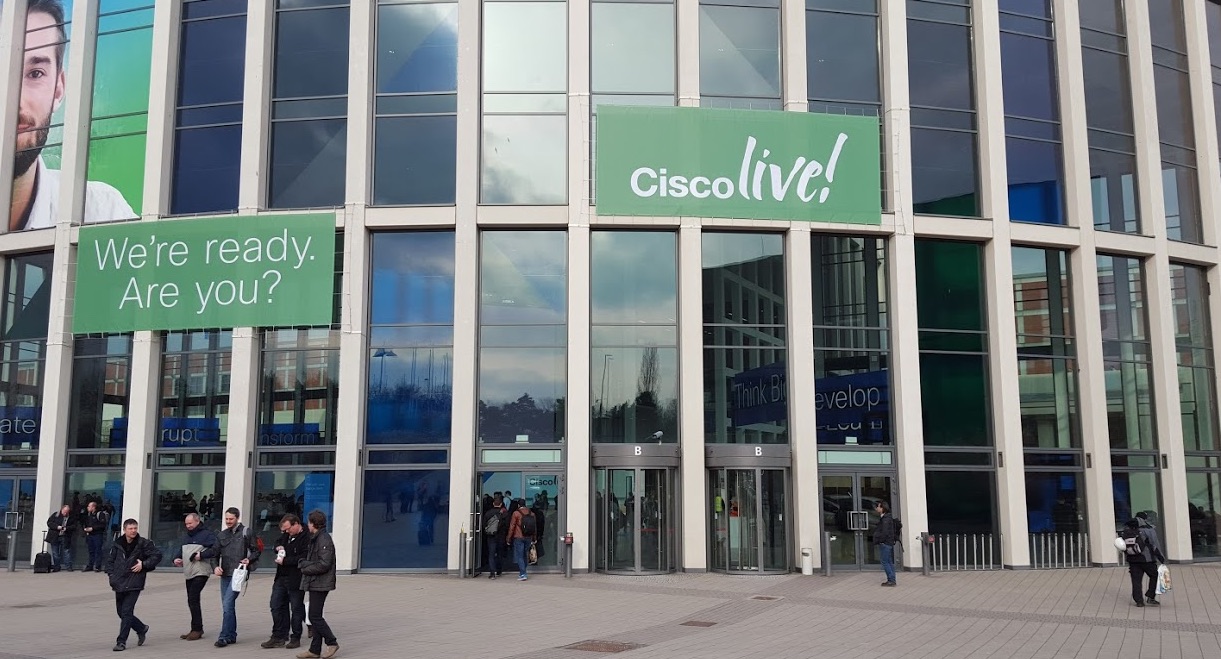
Arriving
By plane
Barcelona has only one international airport, Aeroport de Barcelona-El Prat (El Prat for short), it's on the T9S Metro line, conveniently the same line as the conference centre.
It's located about 13 kilometres from the city centre, and is within a 25-30€ reach by Taxi. A number of airlines fly directly to El Prat, a list of which, and their terminal numbers which can be found here.
You can use various websites such as Dohop or Expedia to book your flights, but it's not always cheaper, there are sometimes options that you miss and it can be easier to book, and deal, directly with the airline. You can use both of these websites to search for the available flights, and then take that information and book directly with the Airline if you so wish.
By train
The main hub of arrival by train is Sants, which intersects with Metro Lines L1 and L5, if you're going directly to the conference you can take the L5 to Collblanc or the L1 to Torassa, and the L9s from there to the conference. Some trains also stop at Place d'Espanya which intersects with Metro Lines L1 and L3, you can take the L1 to Torassa as before to get on the L9s to the conference.
The city of Barcelona has an excellent page about arrival by train. It also includes a list of railway operators where you can book your passage.
By boat
Many ferries operate out of Barcelona and one of your options might be to get in by boat, Direct Ferries has a list of many operators, as with the flight booking websites, I suggest you also take a look into each ferry operators websites for direct booking once you've found your preferred operator.
By car
The city of Barcelona again has an excellent page about arriving by car, do take into consideration that you need to park it somewhere and that parking might be more expensive than buying a plane or train ticket.
Accommodations
The Cisco way
For 2018 Cisco is no longer presenting the classic list of approved hotels, but is instead relying on an outside party Hotelmap.com which they have shared venue details with. Hotelmaps have setup a specific page that is linked from the Cisco Live! attendee page to help you navigate Hotels based on your own criteria.
Hotelmap is offering support in choosing a hotel via telephone or email, this could be of particular interest to you if you're ordering at a late point where there are few options left available. Details are on the Hotelmap webpage linked previously.
The Hotelmap website offers a fairly nice interactive map that allows you to see the hotels in a map layout, you can order the list of Hotels shown on the right side of the screen by a number of criteria, including but not limited to:
- TripAdvisor rating, low to high
- Distance from venue
- Price
- Stars
Other hotel options
If you are feeling a little more adventurous you can use sites such as Trip Advisor which has good (honest) reviews and a list of prices from many hotel sites or browse the many hotel booking sites directly, some examples of which are booking.com, hotels.com and expedia.com to look for Hotels that meet your criteria. Do read the reviews and find out what people liked and disliked. What some people disliked might not matter at all to you and vice versa.
What I look for in a hotel for Cisco Live!
My main criteria for Hotels during the stay is:- Quiet during the night. Because the hotel does not need to be quiet during the day when you're away at the conference you can safely pick a hotel that is undergoing renovation or repair during your stay, which can sometimes save you some money, do check the reviews and see if guests complained about noise at night, some hotels have more guest traffic during the night, particularly those located close to airports.
- Has good breakfast, food on-site varies, but outside of lunch, is often limited to pastries or light snacks, I make it a rule to eat a good breakfast before I depart in the morning, a good breakfast is therefore high on my list of things I need.
- Bathroom and shower in the room, staying a whole week somewhere where you're sharing a bathroom or a shower is out of the question for me, if you think you can live with that for a full week there are cheaper options that open up for you, otherwise you're pretty much limited to 3 stars and up.
- WiFi that works, many hotels offer WiFi (sometimes even free), it isn't always good however, browse the reviews for the WiFi, check if it's free, check if there are data allowances or bandwidth caps (1Gb per day, or even 512kbit max speed is not unheard of, both of which are annoying, but perhaps good enough for email use), check how much it is if it isn't free (you might have to send an email to the hotel or even call them to check), it can sometimes be very expensive, even ludicrously so.
Where in the city should you stay
Where to stay depends a little on your preferences. I've been to Cisco Live! (and Cisco Networkers before that) in 5 different cities over a span of 13 years and I've tried pretty much all of these options. There are pros and cons to each one of them, read them and figure out where you fit.- Stay close to the conference centre:
- Pros
- Shorter transit in the morning, might even be within walking distance so you don't have to leave as early and might save some money on trains
- You can go to the hotel at lunch time or during longer breaks to relax, work, or use the facilities
- Cons
- The conference centre area isn't necessarily in a good place to see anything else, you might have to travel a bit to see the sites. Fira Barcelona is far way away from the La Rambla and the city centre so it isn't a great place to be if you want to shop or dine, but you can of course use the public transport system.
- The choice of reasonably priced options might not be that great, particularly if many people want to stay near the conference centre, check hotels in other areas and if you can find a hotel within a reasonable metro distance don't overpay for a 10 minute saving in the morning, get a better hotel.
- Pros
- Stay downtown:
- Pros
- Choice of restaurants, shops and things to do when you're not at the conference that are within walking distance
- Usually a short walk to the next Metro station, if you have many equal hotels pick the one that is closest to the Metro
- Cons
- Can be expensive, when you don't have a car it's very nice to be downtown so these hotels tend to be a little on the steep side
- Can be noisy, pay attention to what the hotels guests said about noise levels, sometimes hotels face busy streets or are opposite to the police station (!)
- Pros
- Pick your location based on the Metro, stay within 3-6 hops of the conference and 3-6 hops to the city centre. For Barcelona this seems to be near the Placa d'Espanya or even Rocafort subway station. Rocafort is 8 stops away from the conference, 4 stops from La Rambla. Placa d'Espanya is 7 stops away from the conference, 5 from La Rambla. Both locations have a number of hotels in the vicinity at reasonable rates, Placa d'Espanya has two intersection metro lines and is better connected because of that. Hostafrancs which is 6 stops from the conference and 6 from La Rambla, appears to be in an commerical/industrial neighbourhood and might not be the most ideal location, but it is exactly midway.
- Pros
- Relatively quick transit in the morning, depending on how close you are
- Relatively quick transit if you want to go downtown to hit the bars, see the sites or shop.
- Cons
- Might not be the greatest neighbourhood to be in, read some information about the area and check the hotel reviews to see if it is relatively safe.
- Possibly expensive, it's always a little more expensive to be well connected
- Pros
- Pick your location based on where you can get the cheaper hotels a bit away.
- Pros
- If you're on a tight budget this might be the only way to persuade your employer to take the plunge or if you're paying the whole cost yourself this might be what you can afford.
- You'll probably end up in the suburbs in a more quiet area
- Cons
- You'll spend more time on public transit than you might necessarily like
- Usually not a great range of restaurants or shops in the area which might mean even more transit
- Pros
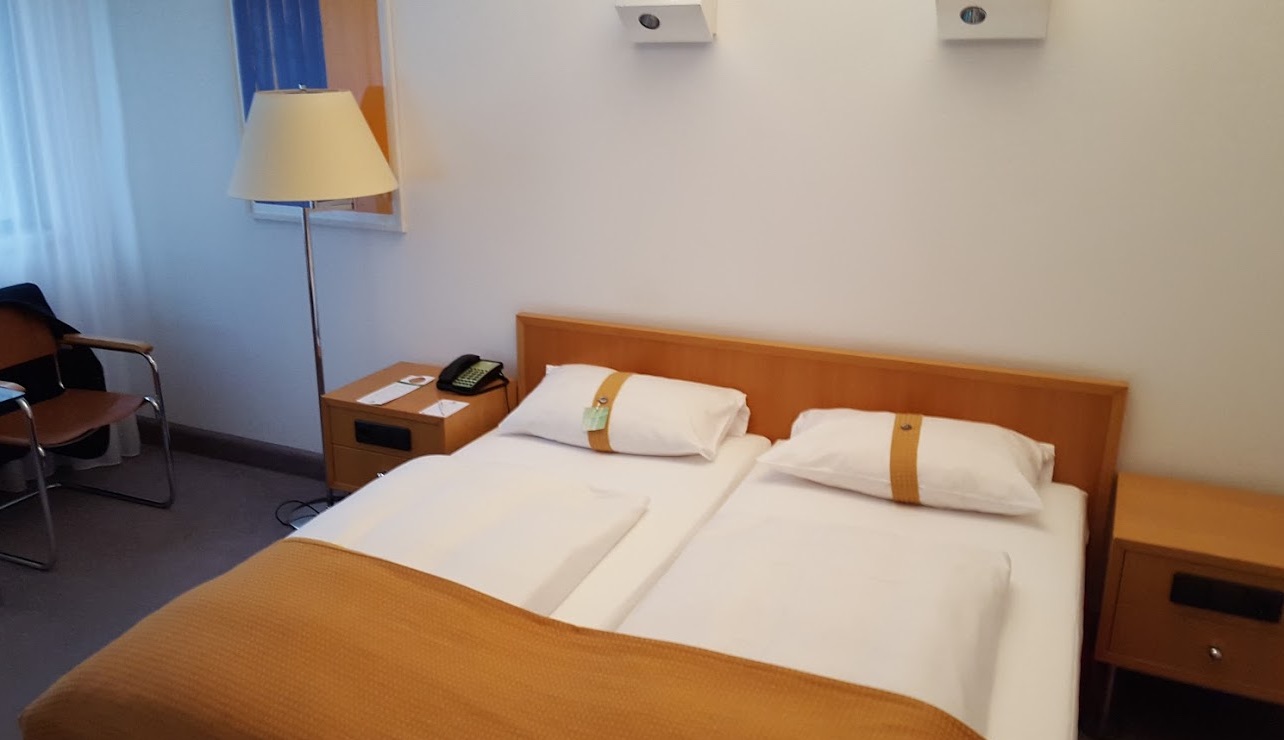
In 2016 in Berlin I stayed in the Spandau area which was far more suburb than I thought it was when I booked it, but was well connected to the Metro. In 2017 I stayed in the Charlottenburg area, also well connected by the Metro but much closer to restaurants and shops. I do recommend you do a bit of googling around the area you are staying in to find out what the ambiance is, particularly if that's important to you.
Whatever you do I recommend you start booking your hotel as early as possible, as you get closer to the conference the prices tend to hike up fast, particularly for the best locations, you can save quite a bit of money by booking early. Even if you are not sure that you'll get to go, you can in most cases book well in advance and not need to pay anything to cancel at a later date.
Plan your sessions
If you're taking tech-seminars (which are on Monday, in the form of 1x8 hours, 2x4 hours or 1x4 hours) you'll need to pick those when you register. To schedule the rest of your time you need to do so when the schedule builder becomes available (usually early November). So what sessions should you take?
- Don't be afraid to take a breakout in the same subject area as you picked your technical-seminar, if it makes sense there is nothing wrong with that.
- Pick a theme for your breakouts, with a ton of sessions available in many different categories it is fairly smart to pick a theme for your sessions. If more than one person is going, picking a theme for each one will make you able to get a lot of knowledge about a few subjects which in the long run generally tends to work out better than being all over the place. This is one of the reasons why sending more than one person from your company is a good idea.
- Take advantage of meet-the-engineer, these are quality people that you won't get many opportunities to meet face-to-face. If you have difficult TAC cases, have implementation questions for a particular platform (or need a how do I do this on this platform) or even if you just want to discuss the idiosyncrasies of a particular platform.
- A lot of Cisco people come to Cisco Live! Your Cisco account manager might be able to schedule some meetings for you with some higher ups if you need to discuss a particular case or a large project with someone in the know or a project manager for a platform.
- If you need hands on in a particular subject take advantage of all the available labs.
- If you are on your path to certification you might want to take advantage of your free certification exam while you are at the conference, same applies for re-certification.
Getting to the conference from your Hotel
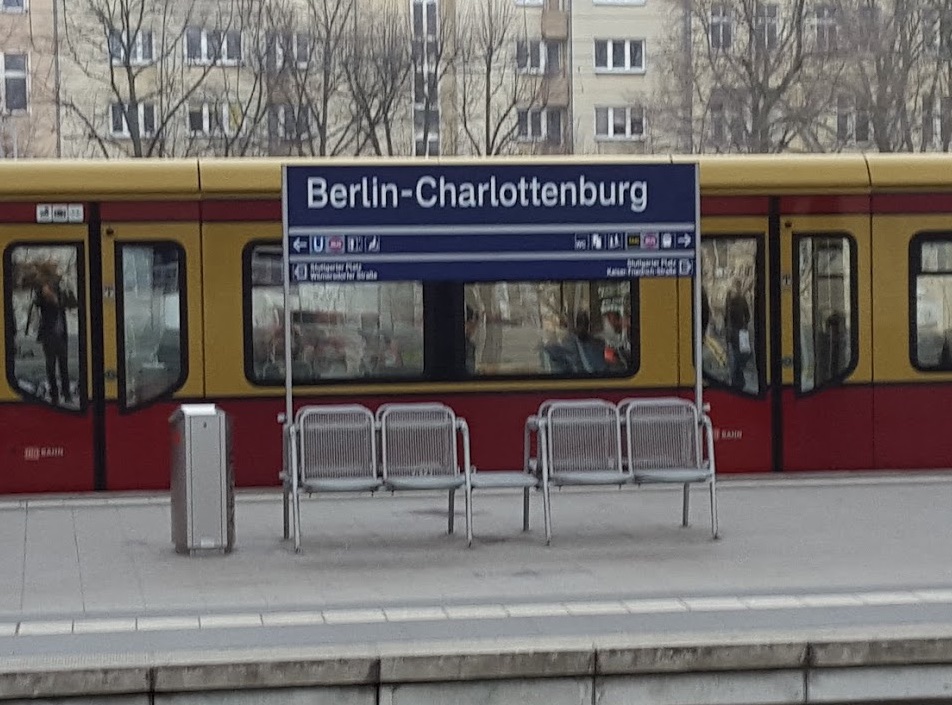
Getting to the conference by train is by far the best option you have, unless you are within walking distance. You can take a Taxi, usually more pricey but is more comfortable and you're guaranteed a seat. Don't bet on the Taxi being faster though, it has traffic to compete with. If you have your own car you could also drive to the conference centre, Cisco suggests a car park about a 10 minute walking distance of the conference area called NN Zona Franca, you can reserve a space here
Trains
TMB offers train services in Barcelona. They offer an app which is available for download from the App Store and Play Store.
From TMB you can get a Subway map with the main players in Barcelona, in PDF form, also on offer is an Interactive metro map and a Interactive router planner and map site, the L9s line goes to the conference centre
The Metro station serving the conference centre is Fira station (on the L9 Sud line, Aerport T1 / Zona Universitaria).
If you need to change trains the L9S intersects with:
- L1, Hospital de Bellvitge/Fondo, at Torrassa
- L3, Zona Universitària / Trinitat Nova, at Zona Universitaria
- L5, Cornellà Centre / Vall d'Hebron, at Collblanc
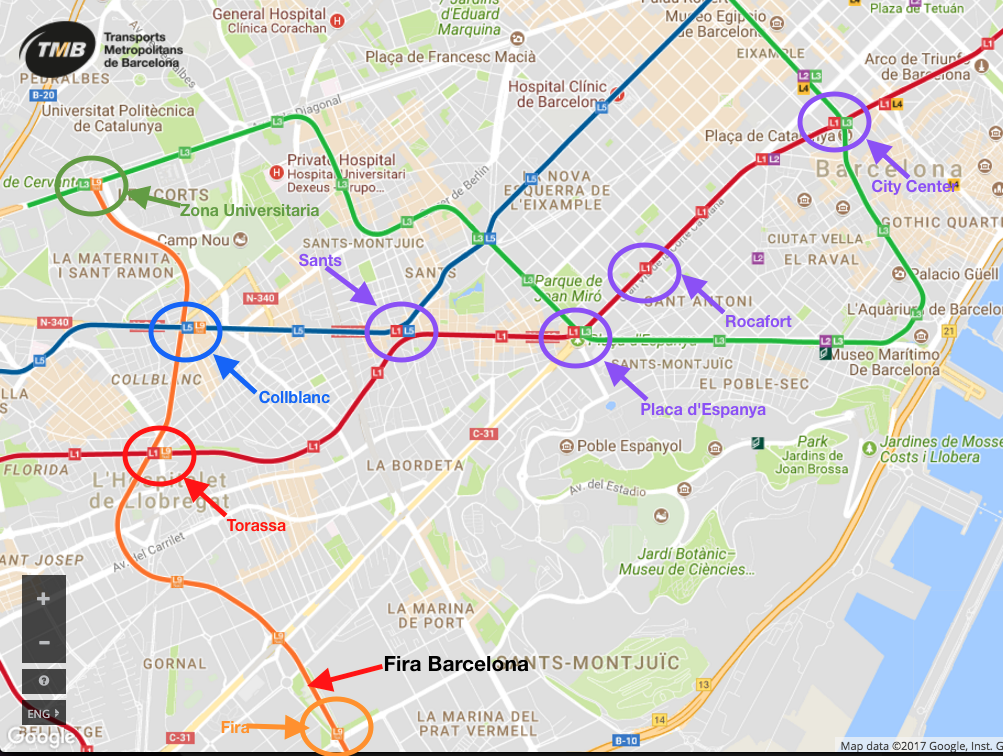
Tickets
Hola BCN! is the Barcelona Travel card, it offers a 2, 3, 4 and 5 day pass using the Metro Bus system, urban railway (FGC, Zone 1), TRAM and regional railway Zone 1.
They will email you a voucher you can use at any Metro station to pick up your card when you arrive. The cost is is from 13.05€ (2 day pass) to 30.33€ (5 day pass). The pass is also valid for transport to and from El Prat airport, which is handy if you're arriving there.
You can buy online, here
There's also a very helpful page at Fira Barcelona on how to get to and from the venue that you can find here
Arrival and the first day
Those of you who have signed up for technical seminars or have enlisted in the DevOps program should arrive no later than midday Sunday to have time to register before registration closes so you don't have to do that on Monday morning, if you're just attending the breakout sessions you can arrive on Monday and register in the afternoon for an early Tuesday start.
Practice run
It is beneficial to do a trial run of the route (hopefully selected with the dijkstra algorithm) you're going to be travelling to the conference, particularly if you're going to be using the Metro. You can roughly time your trip and figure out which way you have to go into the station to get to the track you want. There are often multiple entrances (and exists), particularly to the larger Metro stations, pick the one that gets you to the right track in the shortest amount of time, this will matter more when there is more traffic in the morning and you can barely see where you are going.
If you need to change trains you should also figure out what the best route from your current track to the track you need to go to is. It's also far better to go in the wrong direction on the trial run than it is to do it on your first day.
Early registration and the App
Registration opens on Sunday at 15:00 and is open until 20:00 for those who arrive on Sunday for the main conference. If you arrive at a reasonable hour on Sunday you can use your practice run to go and register, that will save you from having to do so on your first day. Similarly if you arrive on Monday for the Tuesday start, registration is open from 08:00 till 19:00 and it's good to finish up the registration before the first day.
When you register you'll get your computer bag (and whatever goodies are in it) as well as your badge which you're required to wear at all times during the conference, the bag you don't really need to bring with you but it's good to have something to carry your stuff in. To register you'll have to log into the registration computer with your ciscolive.com username and password (that you used to register) so you'll need to bring that with you or memorize it. You'll also need a valid ID.

The Cisco Events app is now available from the Play Store and the App store. The app has the full event schedule, all speakers and exhibitors, the venue map and integration with social networking.
Learn your way around
You should know which entry point you'll be using (the North Access of Fira Gran Via is used) and spend a little time in the Cisco Event Map studying the floor plans. Find the room where you first session is and figure out how to get there. You'll have a little more perspective after you at least go there for the registration.
It is remarkably easy to get lost in any conference centre. Cisco does a decent job of making information signs for you and there are lots of people there to help you, don't be afraid to stop and ask rather than spending 20 minutes aimlessly walking around!
Extra power
Bring a power bank for your mobile device. With frequent use of the Cisco Events app, using the map features in your phone, checking your email and using social media you risk running out of juice before the day is finished (or before lunch even), having an extra power bank with 1 or 2 charges in it means no worrying about running out at the worst moment, bringing an extra charger to charge the power bank during the night is not a bad idea either.
Social Media
Cisco Live! is on Facebook and on Twitter (@ciscoliveeurope) amongst other Social Networks. Use #CLEUR to take part in the conversation and network with your peers on Social Media.
Sleep
This might seem like childish advice but you're going to need to sleep while you're there. A full day of technical-seminars or breakouts will make your brain mush by the week-end and you need to sleep to rejuvenate. Go to bed early and get a good nights sleep for the first day as well as all the other days that follow.
Dressing for success
There is not much of a dress code, wear what makes you comfortable. Do remember to wear comfortable shoes, there is quite a bit of walking involved. Some people arrive in one set of shoes and change to flip flops, Birkenstocks or whatnot when they arrive at the conference so they don't have to travel to the conference in open shoes or can change shoes when they leave the conference, if you do so I like to bring a bag to put them in, which you can then place inside your Cisco bag!
The AC at the conference varies, sometimes (particularly during the first day) it can get very warm while they figure out how much of it is needed (or wait for AC units to come in). At other times you're rubbing your hands together for warmth. Don't sit right in front of the AC unit if there is one in the room and it's not a bad idea to bring a sweater that you can take off so you can adjust to the room temps.
First day
If you follow my advice and get registered the day before and do a trial run of your route you'll know pretty well when you should leave for your first day. If your session starts at 9, don't plan on being there at exactly 9, be there no later than 8:30, it will take you time to get to the correct room and you'll need to be there before the session starts to have your badge scanned and get a decent seat. This applies for all the days and all sessions in general, get there in plenty of time. You can read your email and add to your caffeine supply while waiting for the session to start. If you arrive late there's a chance you won't get a seat, even if you are registered for the breakout.
Lunch
Lunch is served in designated areas for those with a full conference pass. The lunch tends to be OK but you also have the option of going out for Lunch to any of the places nearby. TripAdvisor has a list of places nearby along with reviews.Rest of the conference
Hopefully you'll have a ton of fun in your tech-seminars, breakouts, labs and whatever else you attend. Here are couple of other things I think you should consider doing:
- Go to the opening party at the World of Solutions. The World of Solutions is where Cisco and others show off their products for you. There is food, drink, and products to see and try out. There is quite a bit of pushing to try to sell you something (or scan your badge) but there are plenty of smart products on display, some of which are bound to interest you. Cisco has also many booths dedicated to certain areas where they are showcasing the latest hardware and software for the various platforms. The World of Solutions opening party which is at the end of Tuesday is a good time to browse and see what interests you. This year there's an additional party on Wednesday (and really, you can never go to too many parties)
- Go to the Keynotes, it's not always wildly interesting but you shouldn't miss it, at least you can discuss it with your peers.
- If you go to the conference lunch, pick a random table and meet other people. There are great conversations to be had with people of different nationalities that are dealing with the same issues you are. In recent years there's also been the addition of lunch and learn, where specific tables are reserved for a particular topic, this is a great way to learn and interact with your peers.
- Go to the Customer appreciation event on Thursday night, meet your peers, sample the food and drink, enjoy the entertainment and even dance. Most of all have fun!
- If you're particular about what you like to eat during the breaks, bring your own snacks, there are light snacks available but they tend to be tuned to whatever nation is hosting the conference, if you like Spanish snacks, you don't need to bring your own.
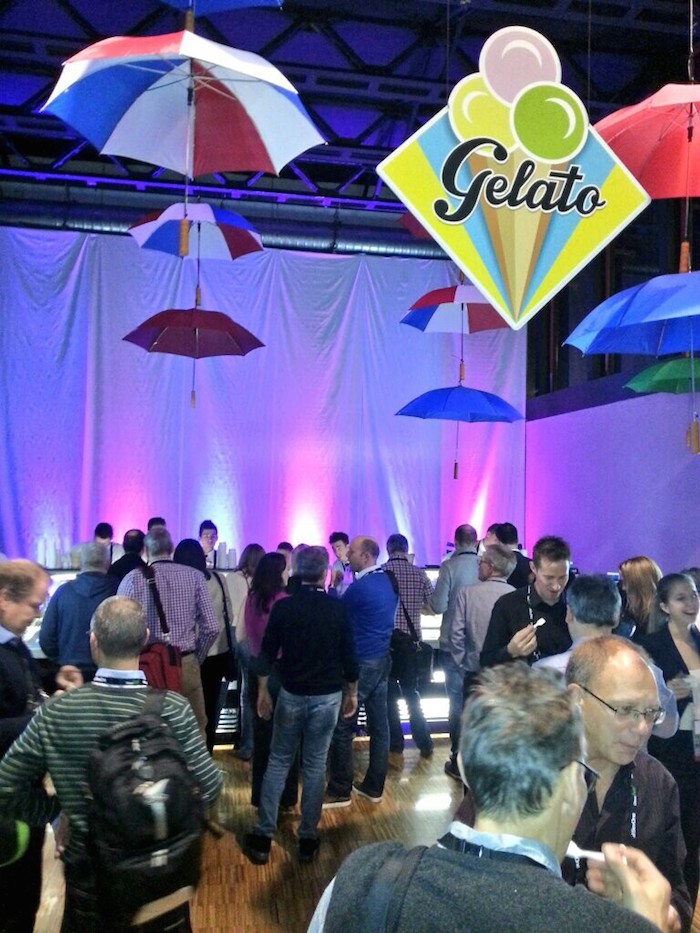
Going home
Some people take Friday off and go home on Friday morning, I tend to think that's a bit of a waste because you can squeeze two breakouts on Friday, if you take advantage of that, the conference end is at 13:30 on Friday, at which point you'll turn in your badge, grab your lunch bag which Cisco graciously provides you with (sandwich and chips or something to that order) and head back to the Hotel to get your bag which your friendly concierge will store for you while you're at the conference after having checked out Friday morning.
It's reasonable to take a flight back home at around 17:00 if you are leaving by plane, that should give you a little time to get back to the Hotel, grab your bag and get to the airport. You can perhaps get away with leaving a little bit earlier if you are pre-checked in and you know how long it will take you to get to the airport, I don't like to be very stressed so I like to have more time rather than less. There's also the option off leaving on Saturday morning, there's far less stress involved in doing that, and it saves you from having to stress through rush hour on a Friday on your way to the airport.If you're travelling by train the same applies except you don't need to arrive as early, leave some time though so you don't miss your train.
The end
Thank you for taking the time to read this, I hope you enjoyed it and that you learned something and I wish you an excellent time at Cisco Live! Perhaps I'll see you there!